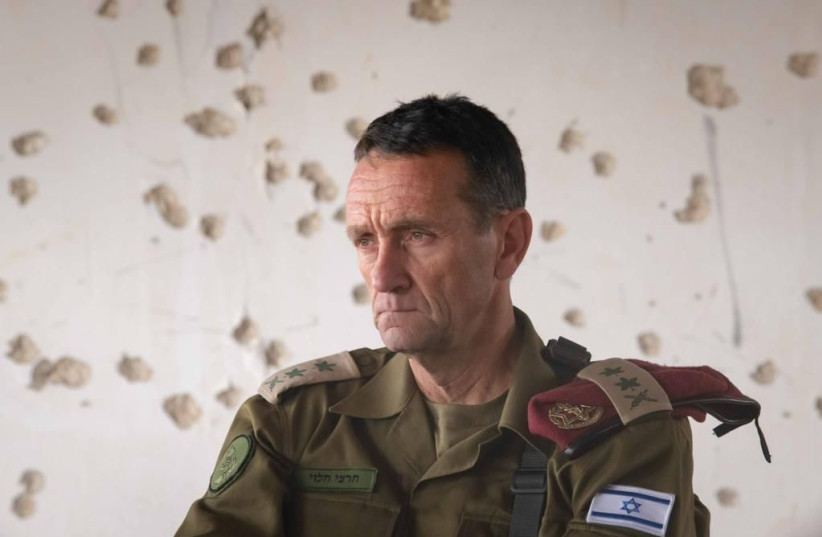In an address at Latrun yesterday, IDF Chief of Staff Lt.-Gen. Herzi Halevi strongly endorsed the People’s Army model. He is clearly on target.
“For 75 years, the People’s Army model has proven beyond any doubt that there is not and there must not be any substitute,” Halevi said. “It is the secret of the IDF’s strength, the secret of the nation’s strength.”
“For 75 years, the People’s Army model has proven beyond any doubt that there is not and there must not be any substitute. It is the secret of the IDF’s strength, the secret of the nation’s strength.”
Herzi Halevi
Halevi made the comment at the launch of a project called “Walking the Paths of the IDF,” in which soldiers will take part in a legacy march following significant routes in the IDF’s history.
What is the IDF's People's Army model and what is threatening it?
The People’s Army model is based on the idea of Israel’s founding prime minister, David Ben-Gurion, that the IDF should reflect all segments of the country’s population. Ben-Gurion believed that the army should be a melting pot that would create social cohesion among Israelis from diverse backgrounds and build up a national identity.
Because the regular army is relatively small, according to this model, it draws on reservists from the entire population. One of the primary aims of the People’s Army model was for the military to be apolitical, in order to serve as a powerful force that functions above politics.

This is particularly relevant in light of the government’s controversial new draft bill that would lower the exemption rate for haredi (ultra-Orthodox) men from 26 to between 21 and 23. Under the proposal, yeshiva students would be exempt from military service to join the workforce at a younger age. Currently, many choose to continue their religious studies until the age of 26 in order to avoid service.
On Sunday, Prime Minister Benjamin Netanyahu convened a high-level meeting in Jerusalem to discuss the new bill. Government officials pointed out that the new bill would also include an increase in the amount of compensation and benefits for those who do serve in the IDF.
A senior military official told reporters in a briefing that the legislation would be acceptable as long as the IDF remains a People’s Army, saying that it is “forbidden to violate the balance of drafting all segments of the populace, including haredim.” The official pointed out that the army has developed special tracks for haredi soldiers, including the Nahal Haredi, in which soldiers from ultra-Orthodox backgrounds serve.
In an address to his Yesh Atid faction in the Knesset on Wednesday, Opposition Leader Yair Lapid called for the ongoing negotiations over the government’s plan to overhaul the judiciary to include the new proposal on exempting haredim from serving in the military. Lapid lashed out at what he called the government’s “national evasion law,” claiming that it constituted an “attack on Israeliness in the name of Judaism.”
Currently, about a third of young Israeli men do not enlist in the IDF, about half of them from the haredi sector who are exempted from duty under the current Draft Law, which expires on July 31. About 45% of women do not serve in the military on religious grounds, although many do civilian National Service instead.
The Jerusalem Post’s political correspondent, Eliav Breuer, reported that the leaders of the haredi parties – Shas and United Torah Judaism – have insisted that the prime minister honor his coalition agreements with them and pass the new draft bill before the state budget comes up for a vote, by May 29.
Under a proposal by Finance Minister Bezalel Smotrich called “A New Social Contract for Sharing the Burden,” the government would prioritize equality in the “economic burden” over the “military burden” while minimizing inequality to IDF soldiers by shortening the length of IDF service and providing benefits to those who do serve. Currently, Israeli men are expected to serve for a minimum of 32 months and women for a minimum of 24 months.
Israel cannot allow the People’s Army model to be undermined. It is vital to both the security and social cohesion of the state. We urge the government to reach a fair national consensus on the new draft bill, based on that model. As Halevi told the soldiers, referring to the IDF legacy march, “We will put on our uniforms and leave all disputes outside so that the citizens of Israel and its youth will know that we have one common denominator – the security of the state.”
